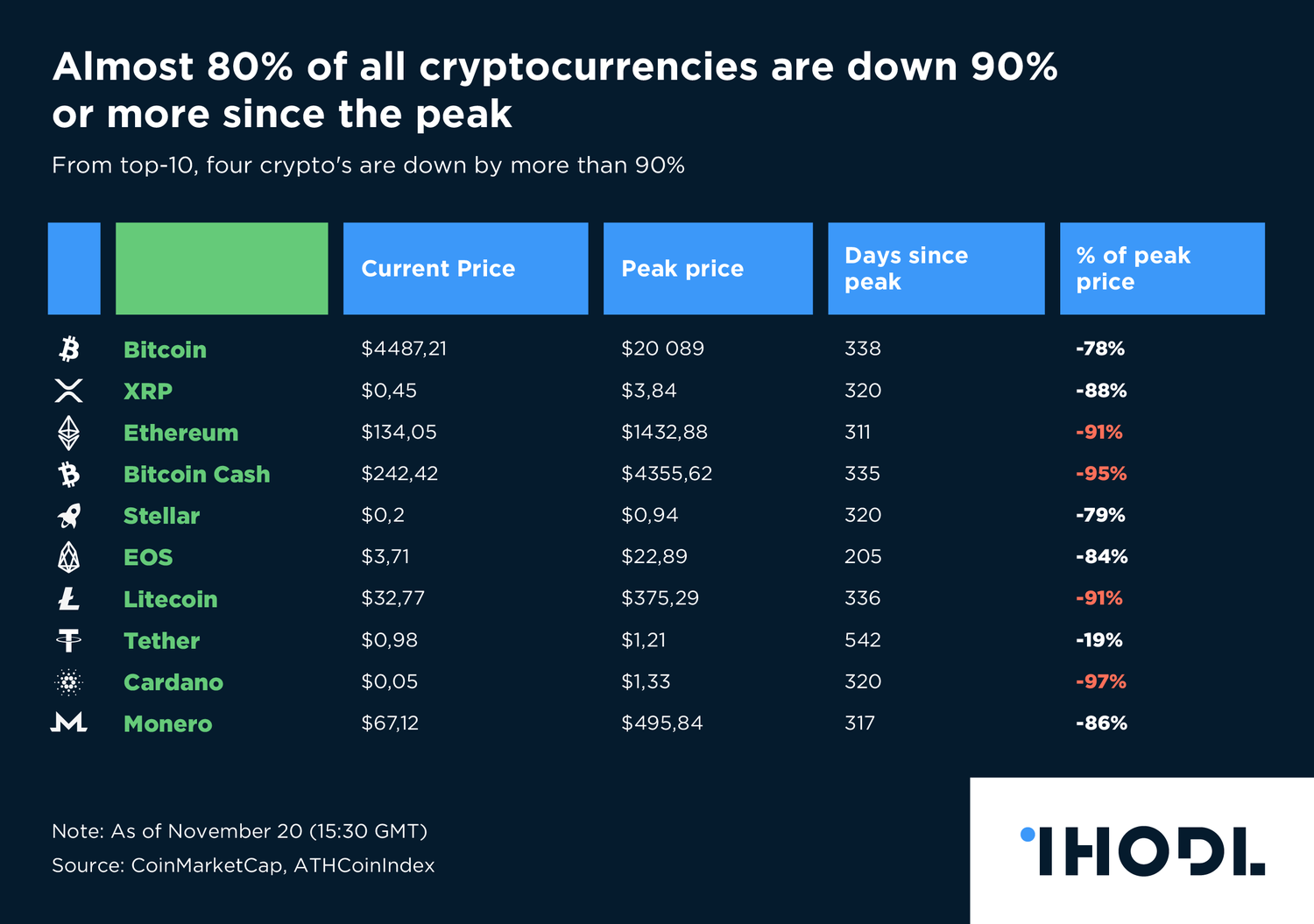cryptocurrency
Cryptocurrency
Furthermore, some who defend Bitcoin argue that the gold and banking sector — individually — consume twice the amount of energy as Bitcoin, making the criticism of Bitcoin’s energy consumption a nonstarter. https://pincollectorssite.com/ Moreover, the energy consumption of Bitcoin can easily be tracked and traced, which the same cannot be said of the other two sectors. Those who defend Bitcoin also note that the complex validation process creates a more secure transaction system, which justifies the energy usage.
The total crypto market volume over the last 24 hours is $260.66B, which makes a 31.08% decrease. The total volume in DeFi is currently $11.42B, 4.38% of the total crypto market 24-hour volume. The volume of all stable coins is now $238.24B, which is 91.40% of the total crypto market 24-hour volume.
A hard fork is a radical change to the protocol that makes previously invalid blocks/transactions valid, and therefore requires all users to upgrade. For example, if users A and B are disagreeing on whether an incoming transaction is valid, a hard fork could make the transaction valid to users A and B, but not to user C.
However, while Nakamoto was the original inventor of Bitcoin, as well as the author of its very first implementation, he handed the network alert key and control of the code repository to Gavin Andresen, who later became lead developer at the Bitcoin Foundation. Over the years a large number of people have contributed to improving the cryptocurrency’s software by patching vulnerabilities and adding new features.

Cryptocurrency news
Bradley Beatty, Lillian Finance LLC (Lillian Finance) – Lillian Finance was a cryptocurrency company and token founded by Bradley Beatty, 48, of Florida. Beatty is charged in an indictment with wire fraud. Lillian Finance allegedly purported to use blockchain technology in the healthcare industry and to use a portion of proceeds generated from token sales for charitable purposes. Beatty allegedly made a series of false statements about Lillian Finance to attract investors, for example, that he was a defense contractor and that he had addressed Congress on the topic of cryptocurrency. Thereafter, it is alleged that Beatty generated hundreds of thousands of dollars in proceeds from retail sales of the Lillian Finance token and misappropriated a portion of Lillian Finance’s profits that were supposed to be used for charity.
Jameson Lopp, the co-founder and chief security officer of Casa, a security firm focused on protecting cryptocurrency users, has been keeping track of physical thefts designed to steal cryptocurrency for around a decade.
The charge of market manipulation provides for a sentence of up to 20 years in prison, up to three years of supervised release, a fine of up to $5 million or twice the gross gain or loss from the offense and forfeiture. The charge of wire fraud provides for a sentence of up to 20 years in prison, up to three years of supervised release, a fine of up to $250,000 or twice the gross gain or loss from the offense, restitution and forfeiture. The charge of conspiracy to commit wire fraud, market manipulation and/or to conduct an unlicensed money transmitting business provides for a sentence of up to five years in prison, up to three years of supervised release, a fine of up to $250,000 to twice the gross gain or loss from the offense, restitution and forfeiture. The charge of conspiracy to commit money laundering provides for a sentence of up to 20 years in prison, three years of supervised release, a fine of $500,000, or twice the value of the criminally derived property, whichever is greater, and forfeiture. Sentences are imposed by a federal district court judge based upon the U.S. Sentencing Guidelines and statutes which govern the determination of a sentence in a criminal case.
De cryptomarkt heeft na de Amerikaanse presidentsverkiezingen een aanzienlijke stijging doorgemaakt. Ook ethereum (ETH) is aanzienlijk gestegen, maar de markt lijkt nu klaar te zijn voor een correctie voordat er verdere winsten geboekt kunnen worden….
The World Economic Forum’s Platform for Shaping the Future of Blockchain and Digital Assets ensures equity, interoperability, transparency, and trust in the governance of this technology for everyone in society to benefit from blockchain’s transformative potential.
Cryptocurrencies
On a blockchain, mining is the validation of transactions. For this effort, successful miners obtain new cryptocurrency as a reward. The reward decreases transaction fees by creating a complementary incentive to contribute to the processing power of the network. The rate of generating hashes, which validate any transaction, has been increased by the use of specialized hardware such as FPGAs and ASICs running complex hashing algorithms like SHA-256 and scrypt. This arms race for cheaper-yet-efficient machines has existed since bitcoin was introduced in 2009. Mining is measured by hash rate, typically in TH/s. A 2023 IMF working paper found that crypto mining could generate 450 million tons of CO2 emissions by 2027, accounting for 0.7 percent of global emissions, or 1.2 percent of the world total
On 25 March 2014, the United States Internal Revenue Service (IRS) ruled that bitcoin will be treated as property for tax purposes. Therefore, virtual currencies are considered commodities subject to capital gains tax.
Although cryptocurrencies are considered a form of money, the Internal Revenue Service (IRS) treats them as financial assets or property for tax purposes. And, as with most other investments, if you reap capital gains selling or trading cryptocurrencies, the government wants a piece of the profits. How exactly the IRS taxes digital assets—either as capital gains or ordinary income—depends on how long the taxpayer held the cryptocurrency and how they used it.
Many cryptocurrencies were created to facilitate work done on the blockchain they are built on. For example, Ethereum’s ether was designed to be used as payment for validating transactions and opening blocks. When the blockchain transitioned to proof-of-stake in September 2022, ether (ETH) inherited an additional duty as the blockchain’s staking mechanism. The XRP Ledger Foundation’s XRP is designed for financial institutions to facilitate transfers between different geographies.

On a blockchain, mining is the validation of transactions. For this effort, successful miners obtain new cryptocurrency as a reward. The reward decreases transaction fees by creating a complementary incentive to contribute to the processing power of the network. The rate of generating hashes, which validate any transaction, has been increased by the use of specialized hardware such as FPGAs and ASICs running complex hashing algorithms like SHA-256 and scrypt. This arms race for cheaper-yet-efficient machines has existed since bitcoin was introduced in 2009. Mining is measured by hash rate, typically in TH/s. A 2023 IMF working paper found that crypto mining could generate 450 million tons of CO2 emissions by 2027, accounting for 0.7 percent of global emissions, or 1.2 percent of the world total
On 25 March 2014, the United States Internal Revenue Service (IRS) ruled that bitcoin will be treated as property for tax purposes. Therefore, virtual currencies are considered commodities subject to capital gains tax.
How does cryptocurrency work
This is a difficult question to answer, since it does depend on where it is that you reside! In some countries, holding and trading cryptocurrencies is completely legal. However, there are places where crypto is, for a fact, illegal. You should always do your research, and find out the specific situation in your region!
The mainstream adoption of cryptocurrencies is gradually increasing, with more businesses and institutions accepting them as a form of payment. Large companies like Tesla and PayPal have integrated cryptocurrencies into their operations, signalling growing acceptance.
All examples listed in this article are for informational purposes only. You should not construe any such information or other material as legal, tax, investment, financial, cybersecurity, or other advice. Nothing contained herein shall constitute a solicitation, recommendation, endorsement, or offer by Crypto.com to invest, buy, or sell any coins, tokens, or other crypto assets. Returns on the buying and selling of crypto assets may be subject to tax, including capital gains tax, in your jurisdiction. Any descriptions of Crypto.com products or features are merely for illustrative purposes and do not constitute an endorsement, invitation, or solicitation.
In late 2008, Nakamoto published the Bitcoin whitepaper. This was a description of what Bitcoin is and how it works. It became the model for how many other cryptocurrencies were designed in the future.
Once bought, cryptocurrencies can be stored in digital wallets. Digital wallets can be “hot” or “cold”. Hot means the wallet is connected to the internet, which makes it easy to transact, but vulnerable to thefts and frauds. Cold storage, on the other hand, is safer but makes it harder to transact.

